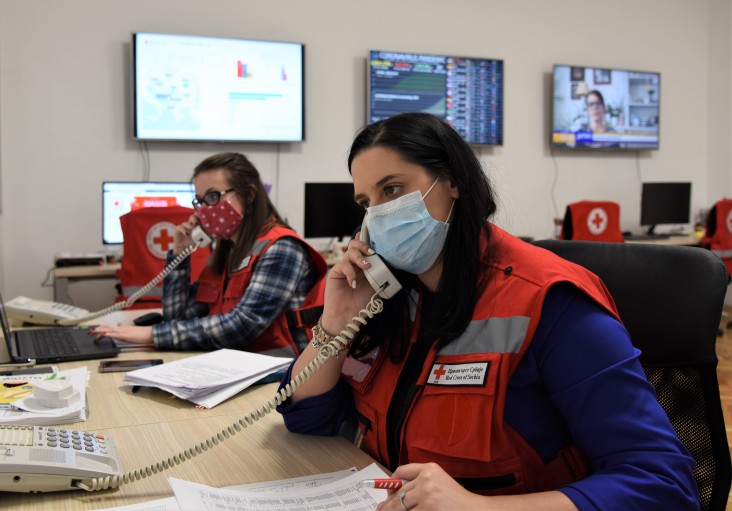Speeches Shim

On March 15, when Serbia declared a state of emergency and imposed curfews and a lock-down for the elderly to halt the spread of COVID-19, many vulnerable people were largely unprepared for the lengthy period of isolation that was to follow.
Fortunately, only days later and with the help of USAID and the International Federation of Red Cross and Red Crescent Societies (IFRC), a state-of-the-art emergency operations center (EOC) became operational at the Red Cross of Serbia with a 24-hour hotline operated by volunteers trained to provide mental health counseling and social services.
“In the first week of the state of emergency we received hundreds of calls, mainly from elderly citizens. They needed help getting their medication, groceries or withdrawing their pensions. Sometimes they just needed someone to talk to,” said Ivana Zulović, Coordinator of the EOC. “In the second week, however, we began receiving more and more calls from middle-aged citizens who lost their jobs and could not make ends meet. Over 90 percent of people who called our hotline during the state of emergency were not previously registered social support recipients. We’d have our field services evaluate their situation and provide adequate support, and we informed them about other state aid mechanisms available to them that they did not know existed.”
“During the state of emergency, we received firsthand information about the situation directly from our citizens, which helped us prioritize and plan our activities better and respond more effectively to the crisis,” added Ranko Demirović, Disaster Management Coordinator. “The Red Cross has never been more accessible to our citizens—the quality and efficiency of our communication with them has been better than ever before.”
With the help of the Commissioner for Gender Equality, Brankica Janković, who volunteered at the Center once a week during the pandemic, and in collaboration with state institutions, the Center swiftly resolved issues that affected various groups of citizens—such as granting free movement to social service providers during the curfew, simplifying access to safe houses for victims of domestic violence or getting the word out about emergency food assistance to persons with disabilities.
"During the pandemic, more than 2,800 Red Cross volunteers have deployed across the country. As a result, 2,500 meals were delivered daily to the elderly, while 85 of their best trained volunteers helped register patients at six health care facilities in Belgrade that were testing for COVID-19. Volunteers also delivered eight thousand food and hygiene parcels, donated by USAID, to families living in devastated municipalities or hard to reach, remote villages throughout the country.
“The quality of our COVID-19 response operation and the quality of our services to citizens improved significantly with the help of the emergency response center,” said Demirović. “All the information that was scattered around is now being systematized and each day we have access to updated infographics that give us a detailed insight into the situation in the field, people’s needs and our actions based on reports from 165 field offices,” added Zulović. “This helps us present ourselves differently to the public and with that the confidence of citizens in the Red Cross has gone up.”
“We received handwritten thank you notes from many elderly citizens who we’ve helped in different ways—not emails or text messages but actual letters,“ said Demirović. “In Aleksandrovac, an elderly resident left a letter at the entrance to the Red Cross office to conform with social distancing measures.“
For future crises, the center in Serbia will be able to coordinate efforts with additional Red Cross National Society emergency operation centers set up with the help of USAID’s Bureau for Humanitarian Assistance and IFRC in North Macedonia and Montenegro, as well as centers soon to be up and running in Croatia, Bosnia and Herzegovina and Albania.

Comment
Make a general inquiry or suggest an improvement.